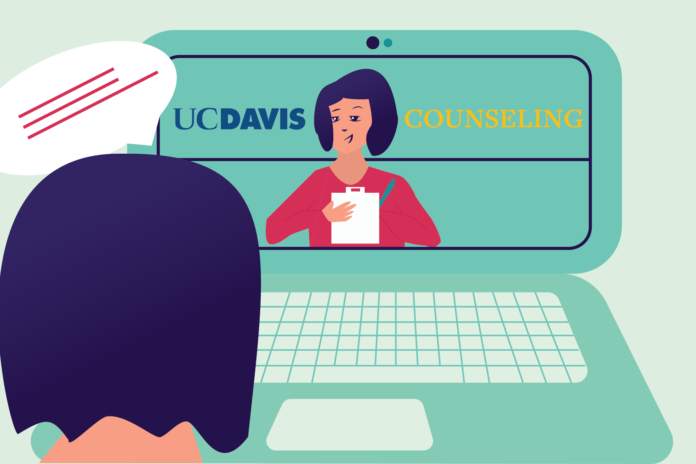Discussing the reality of remote mental health counseling from the perspective of students and SHCS counselors
The Student Health and Counseling Services (SHCS) has transitioned completely to meeting with clients either by phone or video call.
Some students who receive counseling from SHCS over Zoom or another platform have said they feel like the experience of addressing their mental well-being from their home environments is helpful toward recollecting things they want to discuss. Others, however, feel stifled by the constancy of remaining in a personal space, no matter the occasion and a perceived lack of privacy. Katherine Huang, second-year animal science major, says she’s experienced this feeling, and constantly worries that her counseling sessions will be interrupted by family.
“It is sometimes suffocating to sit in a space where my negative emotions have just been uprooted from a counseling session and then immediately having to attend a Zoom class in that same space,” Huang said via email. “I am always afraid someone will enter the room amidst my session, discouraging me from being completely honest which in turn contradicts the progress I may have made previously.”
Aleshia Rose, a second-year communication major, feels as though being at home during sessions stimulates her memory toward topics she wishes to bring up with her counselor.
“On one hand, doing it from home means that I’m in an environment that more accurately reflects how I feel on a day-to-day basis,” Rose said. “I’m looking at the wall that I normally look at. I’m next to my bed, it feels more homey and more comfortable. And in that way, I think it’s easier for me to recall things that I want to talk about.”
Similar to Huang, she said that she experiences a constant feeling that her conversations are being overheard.
“The couple of meetings I did have living here, I felt really uncomfortable because even though my actual roommate left the room, there was a lot of underlying anxiety that everyone could hear what I was saying,” Rose said.
In Huang’s experience, the fear of being overheard, coupled with a lack of understanding within her home, puts a constraint on her ability to fully open up to her counselor.
“My family isn’t necessarily the most understanding or sympathetic when it comes to mental and emotional health,” Huang said via email. “Consequently, I limit what I say and share very vague assessments of my actual well-being for fear of receiving backlash or a dismissal of my concerns if someone were to overhear my conversation during counseling.”
Hillary Alejo, a licensed clinical social worker for SHCS, said she’s had clients with parents who may not be understanding or supportive of therapy and will leave their homes to do the sessions from a car or a public park.
“Sometimes we have students that are back at home where therapy’s not really even accepted or would be really strange for a family,” Alejo said. “So we just try to establish comfort levels and a plan. I have some students that take walks and we do the therapy while they’re walking or I’ve had some that sit outside by a park or wherever they’re at with headphones.”
Dr. Katie Cougevan, a psychologist and the clinical and associate director for SHCS, highlighted some ways in which counselors work with students to re-establish a sense of security during sessions.
“The counselors are very mindful about confidentiality and work with their clients on ways they can find a secure place for sessions,” Cougevan said via email. “Some examples include identifying a ‘code word’ they can use if someone suddenly comes into the space, finding an open space outside using headphones, or pausing the session for a moment until they have privacy again.”
While some feel that being in a home environment is harmful in making progress toward mental health, others have valued the ability to seek counseling services from their phones or laptops, according to Cougevan.
“There are some students who have said they would not have sought out treatment before, and that telemental health has made it much more accessible and reduced their feeling of vulnerability they would have had in person,” Cougevan said via email.
Despite the challenges online counseling can create, according to Cougevan, the demand for mental health services has increased this quarter, including a higher number of first-time visits and on-going sessions. Among the available services there is an option for group counseling.
“We are also finding that students are very interested in participating in our many Group therapy and Group workshop offerings as they give students an opportunity to connect with each other,” Cougevan said via email. “We have increased our [online] offerings, podcasts, classroom presentations, and information on the website as well.”
According to Alejo, while students often struggle with adjusting to online counseling, working with them on this interface has also provided a new window into students’ lives.
“New things have opened up, like they showed me their room or their animals or things like that,” Alejo said. “Sometimes they’re in their family home or they’re using outdoor space. And, you know, it’s been a different way to connect with people. So I can’t say it’s worse. It’s just different.”
SHCS is open for appointments Mondays, Tuesdays, Thursdays and Fridays from 8 a.m. to 4:30 p.m. and Wednesdays from 9 a.m. to 4:30 p.m.
Written by: Lyra Farrell — features@theaggie.org




